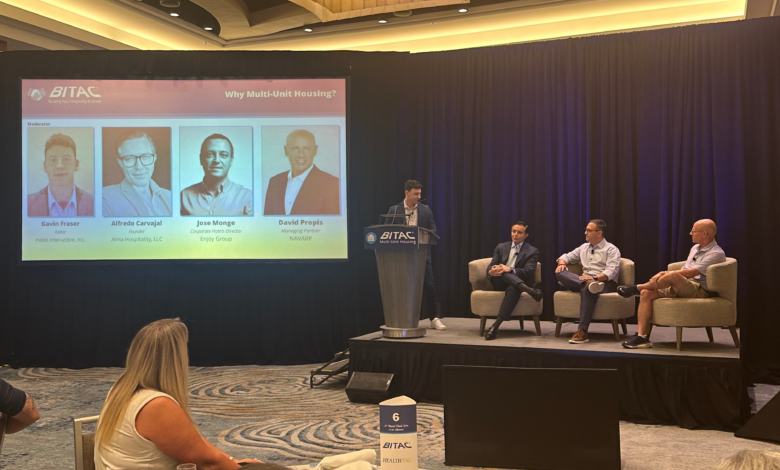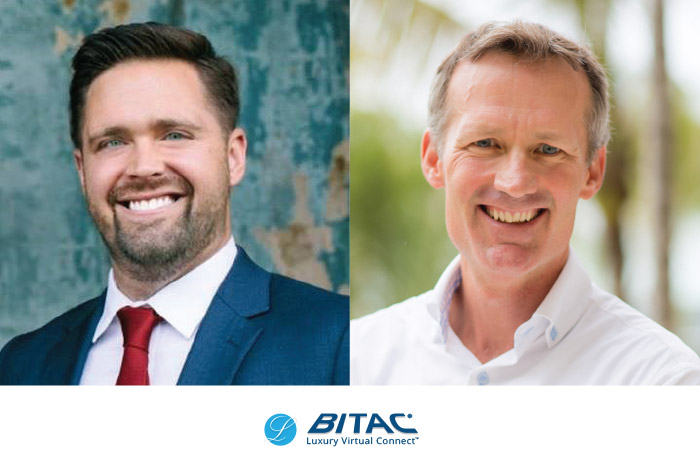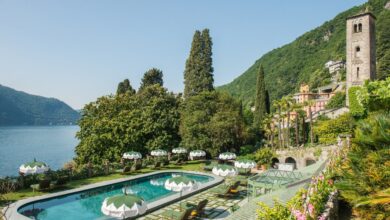
Shaping the Future of Multifamily Housing: A Panel Discussion with Industry Leaders
By Gavin Fraser | September 12, 2024
At the recent BITAC Multi-Unit Housing event at The Ritz-Carlton in Amelia Island Florida, I moderated a dynamic panel with three distinguished leaders in the Multifamily space. We explored the evolving landscape of wellness, sustainability, and property management. The conversation featured Alfredo Carvajal, Founder and Wellness Real Estate Executive at Alma Hospitality; David Propis, Managing Director at North America Value-Add Realty Partners; and Jose Monge, Director Corporativo de Hoteles at Enjoy Group de Costa Rica. Each panelist brought unique insights to the table, reflecting their expertise and experiences in their respective fields.
Integrating Wellness into Real Estate
Alfredo Carvajal, a veteran with over 30 years of experience in the wellness real estate sector, shared his extensive insights in integrating wellness principles into property design and operations. Carvajal emphasized the growing importance of creating environments that enhance health and well-being. “We spend approximately 93% of our lives indoors,” Carvajal noted. “Given this, our living environments must support our health.”
Carvajal discussed how modern properties are incorporating wellness features beyond traditional amenities. He highlighted innovations such as advanced air purification systems, circadian lighting, and smart home technologies that monitor air and water quality. For instance, Carvajal’s projects include features like in-building water treatment plants and systems that ensure a continuous supply of purified water, reflecting a shift towards self-reliance and sustainability. “In places like Los Cabos, where power outages can be common, having systems in place that ensure continuous operation is crucial,” he explained.
Revitalizing Undervalued Properties
David Propis offered a contrasting perspective from the value-add real estate space. Propis focuses on revitalizing undervalued properties, particularly in the workforce housing sector. “We purchase properties that have been mismanaged and are often in poor condition,” Propis explained. “Our goal is to improve these properties and create better living conditions for residents.”
Propis emphasized the importance of upgrading both the physical and operational aspects of properties. While not engaging in high-end wellness features, his approach involves significant improvements to basic living conditions. This includes addressing issues such as pest infestations and poor air quality. “Our focus is on creating cleaner, healthier environments for our tenants,” he said. “Even simple upgrades can make a significant difference in their quality of life.”
Sustainable Development in Latin America
Jose Monge provided insights into the hospitality sector in Costa Rica, highlighting his commitment to sustainable development. Monge, with over three decades in hospitality, is now focused on creating sustainable and inclusive communities. “Sustainability is deeply embedded in our projects,” Monge noted. “In Costa Rica, where 99% of energy comes from renewable sources, we are committed to reducing our environmental impact.”
Monge described various sustainability initiatives, including using eco-friendly materials and ensuring minimal disruption to the natural environment. His projects include outdoor wellness areas, exercise circuits, and water treatment facilities, all designed to foster a healthy and environmentally responsible lifestyle. “We aim to blend sustainability with luxury, creating communities that respect both people and the planet,” he explained.
Adapting to Evolving Tenant and Guest Needs
The panelists agreed that understanding and adapting to the evolving needs of tenants and guests is crucial. Carvajal highlighted the trend of incorporating advanced amenities and community-building features. “Today’s tenants expect more than just functional spaces; they want environments that offer social interaction and wellness benefits,” he said. His projects feature amenities like community gathering spaces, fitness centers, and tech-driven solutions for health monitoring.
Monge also emphasized the importance of meeting guest expectations in the hospitality industry. His projects aim to provide diverse housing options, from affordable studios to luxury residences, each designed with wellness and community in mind. “We are focusing on creating spaces that cater to different needs while promoting a healthy and active lifestyle,” he said.
Propis, although focused on more modest properties, recognizes the value of community engagement. “We may not have high-end amenities, but we create a sense of community through events and personal interactions,” he said. Propis’s properties host regular community events like ice cream days and pizza parties to foster a sense of belonging among residents.
The Role of Sustainability in Property Development
Sustainability emerged as a key theme in the discussion. Carvajal and Monge shared their enthusiasm for integrating sustainable practices into their projects. Carvajal’s initiatives include off-grid systems and water recycling, while Monge emphasized the use of renewable resources and environmentally friendly construction practices.
Propis, while focused on the affordable housing sector, is also attentive to sustainability. He highlighted the importance of cost-effective solutions such as low-flow toilets and efficient HVAC systems. “Our goal is to make sustainable improvements that are practical and affordable for our properties,” he said.
The panel discussion provided valuable insights into the intersection of wellness, sustainability, and property management. Alfredo Carvajal, David Propis, and Jose Monge each presented unique approaches to addressing the evolving needs of tenants and guests. Their experiences highlight the importance of integrating wellness principles, adapting to market demands, and embracing sustainable practices in the real estate and hospitality sectors.
As the industry continues to evolve, these leaders’ perspectives offer a glimpse into the future of property development and management, emphasizing the need for innovation, community engagement, and a commitment to enhancing the quality of life for residents and guests alike.





Get involved!
Comments